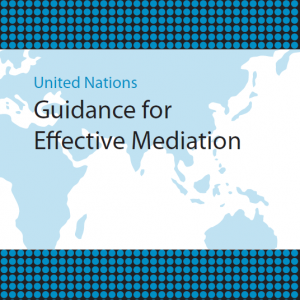Collaboration with the United Nations Mediation Support Unit (MSU)
(United Nations Guidance for Effective Mediation)
Overview
The ICCCR has been actively engaged in a series of initiatives directed to enhance the collaboration between academics working on mediation, conflict resolution, sustainability and peace and the United Nations Mediation Support Unit at the Department of Political Affairs. Through the development of our research agenda on the basic dimensions of mediation and the role of mediator adaptivity, optimality and systemic efficacy in disputant and mediator satisfaction, fairness, efficiency, and sustainability of agreements, we have provided input for the 2012 Report of the Secretary-General on Mediation and the Unit’s guidance for effective mediation. Furthermore, our Dr. Peter T. Coleman, Director of the ICCCR, is also an active member of the United Nations Academic Advisory Council on Mediation (AAC), an organ established by Department of Political Affairs with the purpose of allowing the United Nations to tap into the best research and knowledge available from the global academic community.
Currently, most of our initiatives and collaboration with the MSU revolve around supporting the work of the AAC and the further development and implementation of the Guidance. Our objectives are to develop relevant cutting-edge research on mediation, to serve as a connecting point with mediation experts from our network around the world, and to provide the necessary support for the establishment of an infrastructure that will allow for more collaboration between Academia and the UN in all matters related to international mediation.
Publications
Putting the Peaces Together: Introducing a Situated Model of Mediation
By Peter T. Coleman, Katharina Kugler, Christianna Gozzi, Kyong Mazzaro, Nora El Zokm, and Kenneth Kressel (in progress)
Although academic research on mediation has progressed considerably over the last few decades, it still faces considerable challenges to its practical relevance. Today, the findings from research on mediation present a fractured, piecemeal understanding of what constitutes “effective mediation” and how to achieve it. Research is typically either micro (e.g., mediator style) and decontextualized from the broader system of conflict management, or macro (e.g., case comparisons) and disconnected from mediator decisions and action. As a consequence, many models of mediation practice are not derived from sound theory or evidence-based research (Coleman, 2011). Knowledge generated within academia oftentimes does not reach practitioners and valuable field experiences and practices rarely inform academia – impeding mutual learning and development (Honeyman, 2009; UN Report, 2012).
Services, tools, and resources
Mediation Adaptivity Assessment Tool (MAAT)
Adaptivity, Optimality & Systemic Agency Training
United Nations Macro Mediation Mapping Project
United Nations Guidance for Effective Mediation
The UN Guidance for Effective Mediation, presented in September 2012 at a high-level event on the sidelines of the 67th United Nations General Assembly, is the first broad UN guidance of this kind available to mediators. It reflects the experience of mediators over more than six decades and was developed in close cooperation with United Nations partners including member states, regional and subregional organizations.
Report of the Secretary General on Strengthening the role of mediation in the peaceful settlement of disputes, conflict prevention and resolution (A/66/811)
In its resolution 65/283, the General Assembly requested the Secretary-General to submit a report on the implementation of the resolution entitled “Strengthening the role of mediation in the peaceful settlement of disputes, conflict prevention and resolution”. The present report outlines progress made in implementing the resolution, in the context of key trends in the field of mediation. Also submitted as annexes to the present report are the Guidance for Effective Mediation and the views of Member States.
